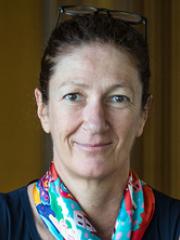Associate Professor Marie-Odile Parat

Researcher biography
Marie-Odile Parat (MO) joined the School of Pharmacy as Senior Lecturer in December 2007.
MO obtained her Pharm.D. from University Joseph Fourier in Grenoble, France, a Masters in Cutaneous Biology from University Claude Bernard in Lyon, France and her Ph.D. in Cell Biology from University Joseph Fourier in Grenoble, France. She further has post graduate diplomas in the fields of Biomedical and Industrial Pharmacy, Photobiology, Pharmaceutical Management, and Public Health.
MO did her Pharmaceutical Residency at the University Hospitals of Grenoble, France in the Sterile Pharmaceutical Supplies Headquarters, the Department of Nuclear Medicine, and the Laboratory Medicine Department of Biochemistry. Attracted by international working experience, she carried out research within the R&D laboratories of Estee Lauder in Melville, NY. She further worked for the United Nations International Trade center in Geneva, Switzerland, where she was the Product Specialist on market information for pharmaceutical raw materials/essential drugs for three years in collaboration with the World Health Organization.
She later performed post-doctoral research in the Universidade de São Paulo, SP, Brasil and The Cleveland Clinic Foundation in the United States. She was appointed as a Staff Scientist in the Center for Anesthesiology Research of the Cleveland Clinic in 2003, an Assistant Professor of Molecular Medicine in the Cleveland Clinic Lerner College of Medicine of Case Western Reserve University, and a Member of the Case Cancer Center.
During her research career MO has attracted awards from various funding agencies including the Research Funding Agency of the State of São Paulo (FAPESP), the American Heart Association, the Ohio Cancer Research Associates, the American Cancer Society, the National Heart Foundation of Australia, Cancer Council Queensland, Australian and New Zealand College of Anaesthetists and the Australia Research Council (ARC).
The long term goal of the Parat laboratory is to provide insight for novel cancer therapies. A basic science team focusses on endothelial and cancer cell migration, invasion, angiogenesis, and specialized plasma membrane subdomains termed caveolae. A translational axis of research evaluates novel mechanisms by which opioids administered to cancer patients modulate the risk of long term tumour recurrence and metastasis.
| Featured projects | Duration |
|---|---|
| Morphine metabolites and tumour growth and metastasis |
